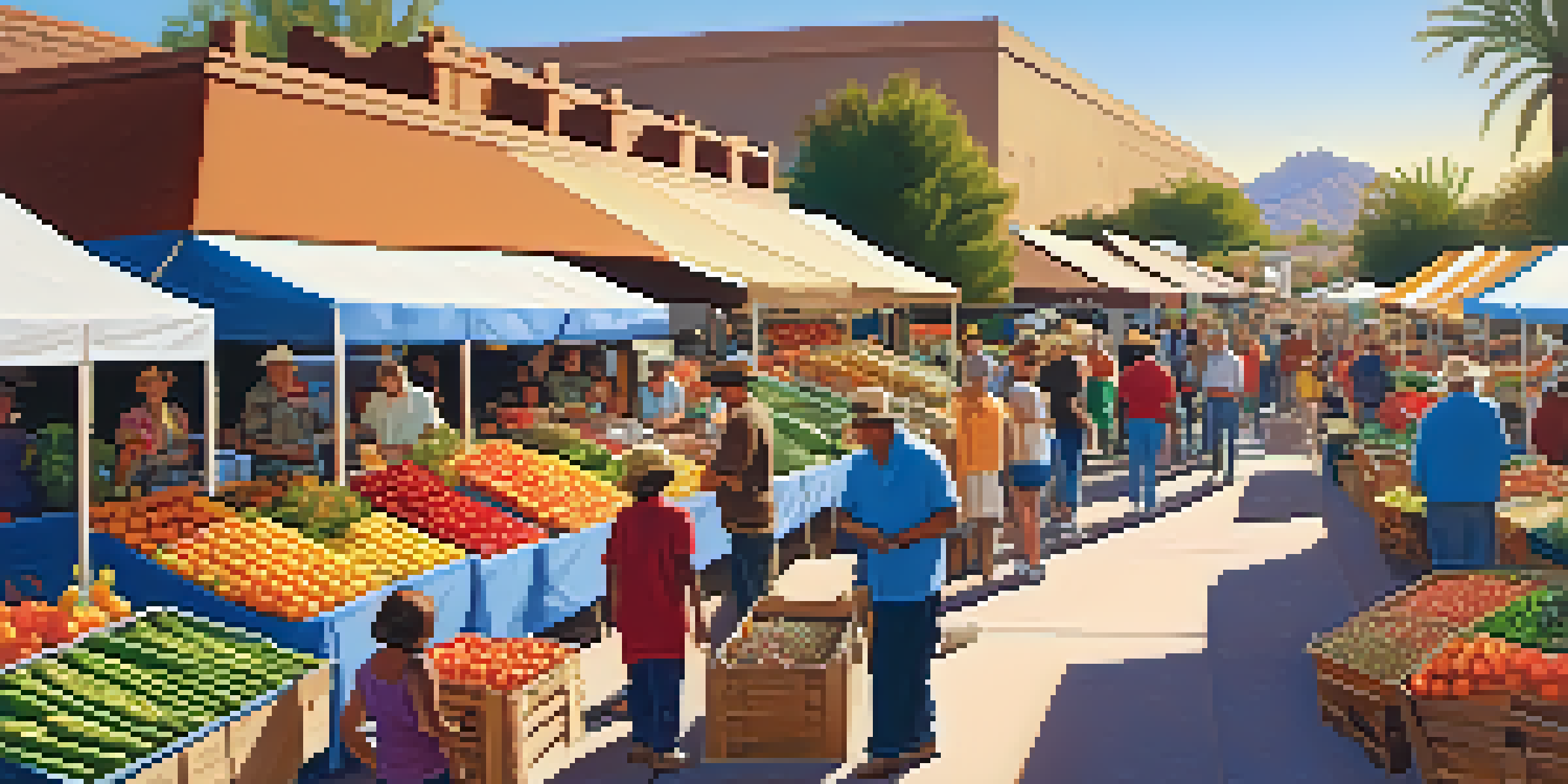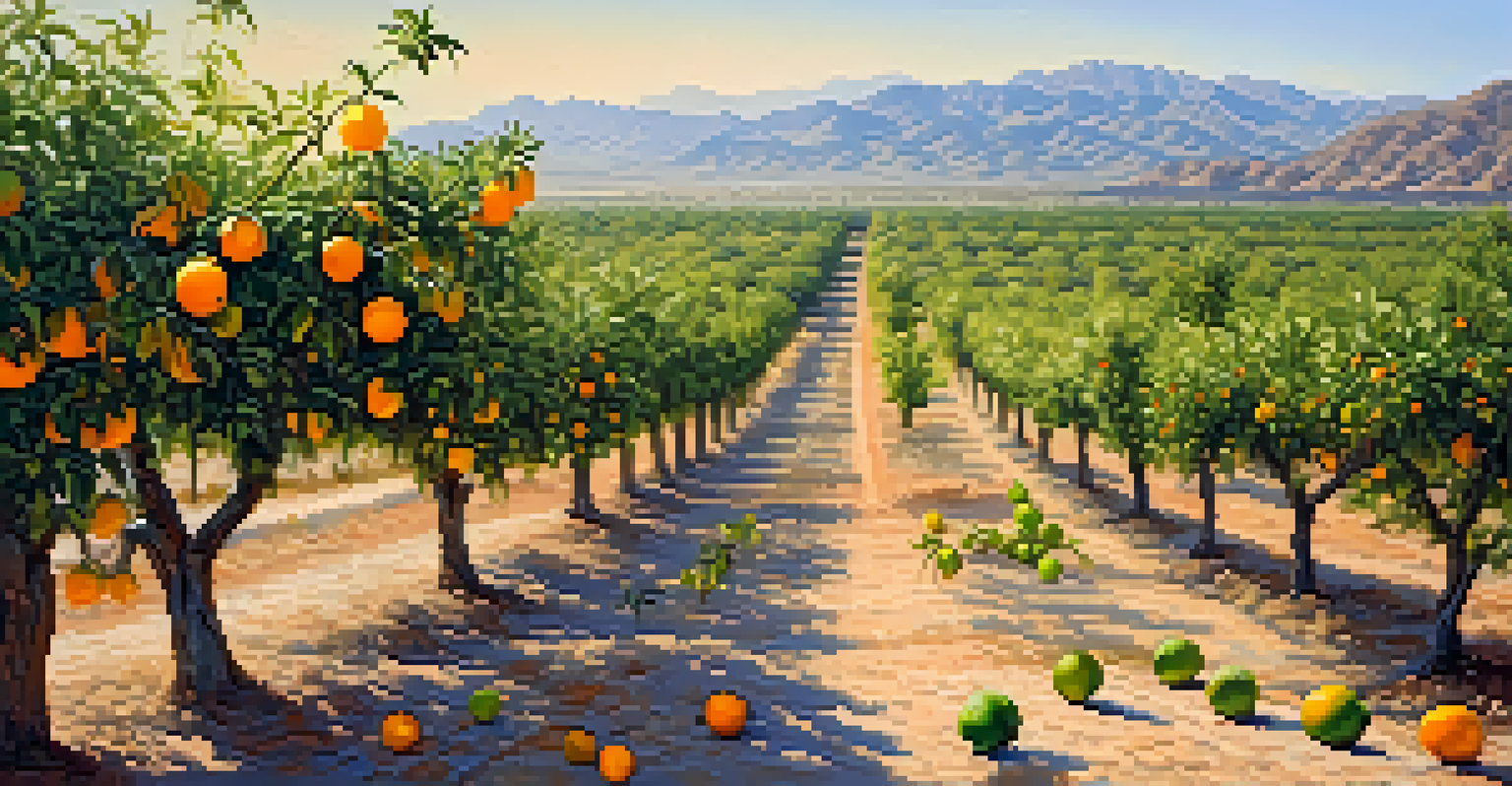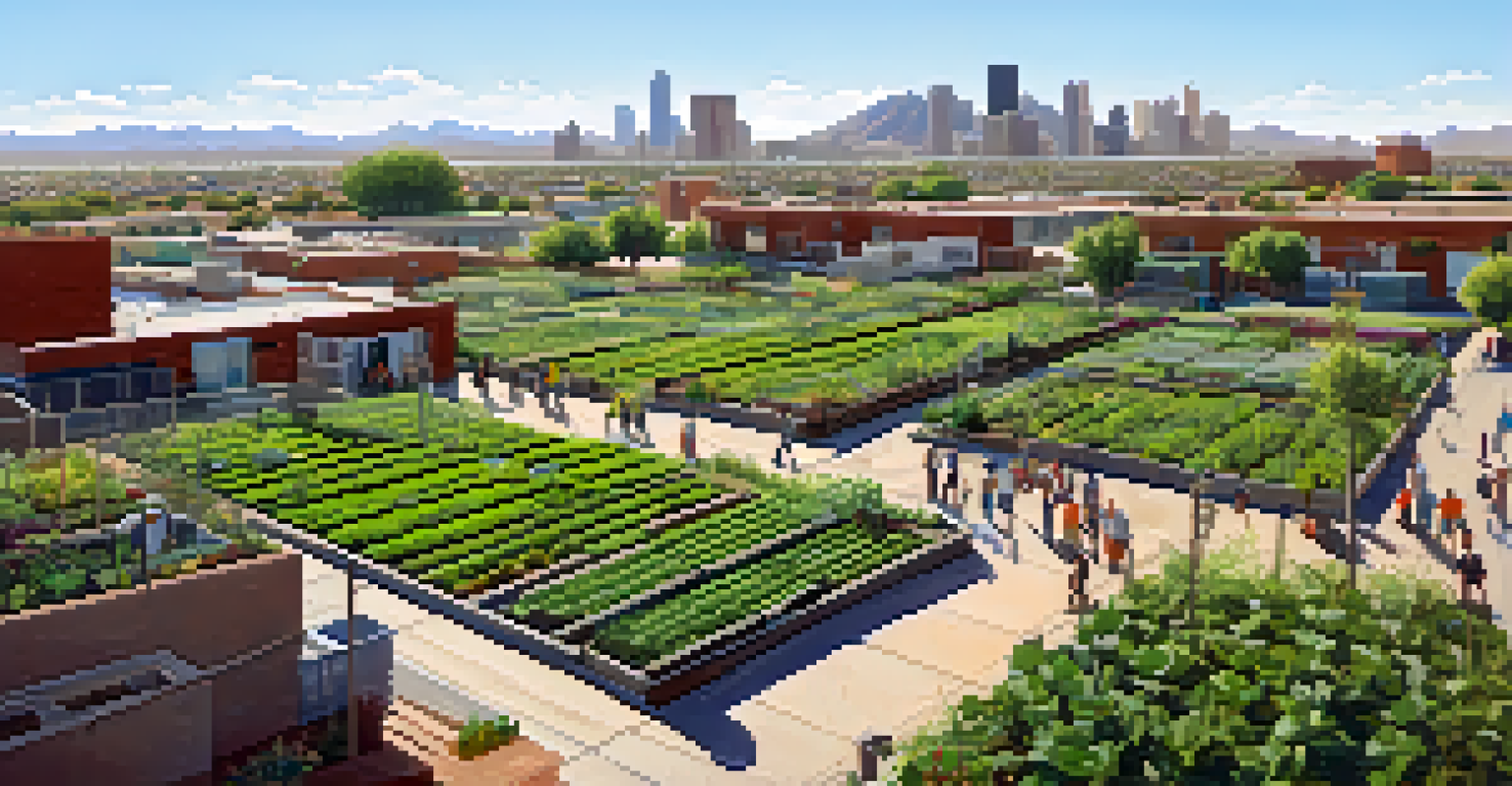The Role of Agriculture in Phoenix's Historical Growth

Early Agricultural Practices in the Valley
Long before Phoenix became the urban hub it is today, the region was home to indigenous peoples who relied heavily on agriculture. The Hohokam civilization, in particular, thrived by developing extensive irrigation systems to cultivate crops such as corn, beans, and squash. This early agricultural practice laid the foundation for sustainable living in the arid desert landscape.
Agriculture is the foundation of civilization and any stable economy.
The use of irrigation was revolutionary, enabling the Hohokam to transform the arid land into fertile fields. Their ability to adapt to the environment demonstrates a deep understanding of agricultural techniques that were advanced for their time. As a result, these practices not only sustained their communities but also fostered a rich cultural heritage that continues to influence the region today.
These early agricultural successes established a strong community bond centered around farming. The shared labor and collective efforts in growing crops created a sense of identity and belonging among the inhabitants, setting the stage for future settlements in the Phoenix area.
The Birth of Modern Agriculture in Phoenix
As Phoenix began to grow in the late 19th century, modern agricultural practices started to take root. The arrival of the railroad and increased irrigation projects, such as the Salt River Project, provided the necessary infrastructure for farming to flourish. Farmers began to experiment with new crops and techniques, which diversified the local economy.

With the introduction of crops like citrus fruits and cotton, the agricultural landscape of Phoenix evolved significantly. These cash crops not only provided income for local farmers but also attracted new settlers to the area, creating a bustling economy that relied heavily on agriculture. This influx of people contributed to the rapid growth of Phoenix as a city.
Agriculture's Historical Roots
The Hohokam civilization's early irrigation practices laid the groundwork for sustainable agriculture in the Phoenix area.
The lush orchards and expansive fields transformed the region's image from a barren desert to a thriving agricultural hub. This shift played a crucial role in establishing Phoenix as a significant player in Arizona's economy and highlighted the importance of agriculture in the city’s identity.
Agriculture's Role in Community Development
Agriculture has always been at the heart of community development in Phoenix. Local farming not only provided food but also fostered a sense of community among residents. Farmers' markets and community-supported agriculture (CSA) programs became popular, helping to connect consumers directly with the source of their food.
The farmer has to be an optimist or he wouldn’t still be a farmer.
These initiatives encouraged local sourcing and sustainable practices, which strengthened the community bonds. As residents gathered to support local farmers, they created a network of relationships that enriched the fabric of Phoenix. This sense of community is an integral part of what makes Phoenix unique.
Moreover, agricultural festivals and events have become a staple in Phoenix, celebrating the region's farming heritage. These gatherings not only promote local products but also educate residents about the importance of agriculture in their lives, ensuring that the connection between farming and community remains strong.
Economic Impact of Agriculture on Phoenix
The agricultural sector has had a profound economic impact on Phoenix, contributing significantly to job creation and revenue generation. Farms, processing facilities, and agricultural-related businesses provide thousands of jobs, making agriculture a vital part of the local economy. This sector not only supports farmers but also stimulates growth in ancillary industries, such as transportation and retail.
In addition, agriculture has positioned Phoenix as a key player in the national and global markets. The city's products, especially fruits and vegetables, are shipped across the country and even internationally, further solidifying its economic footprint. The success of these agricultural exports has helped to diversify the local economy, making it more resilient to fluctuations in other sectors.
Economic Growth Through Farming
Modern agriculture has played a crucial role in Phoenix's economy, creating jobs and attracting new settlers.
As Phoenix continues to develop, the agricultural industry remains a cornerstone of its economic structure. The ongoing investment in innovative farming techniques and technology ensures that agriculture will continue to thrive and adapt to the changing needs of the community.
Environmental Considerations in Agriculture
Farming in the desert presents unique environmental challenges, and Phoenix is no exception. Water scarcity is a significant concern, pushing farmers to adopt sustainable practices that conserve resources. Techniques such as drip irrigation and xeriscaping are increasingly popular, allowing for efficient water use while maintaining productive farms.
Moreover, the rise of organic farming practices reflects a growing awareness of environmental impacts. Farmers are prioritizing soil health and biodiversity, aiming to produce food without harmful chemicals. This shift not only benefits the environment but also meets the increasing consumer demand for organic produce.
As the agricultural community in Phoenix grapples with these environmental challenges, its commitment to sustainability becomes essential. This focus on responsible farming practices ensures that agriculture can continue to thrive while preserving the natural resources that make it possible.
The Future of Agriculture in Phoenix
Looking ahead, the future of agriculture in Phoenix appears promising, driven by innovation and technology. Advances in agricultural technology, such as precision farming and automated systems, are helping farmers maximize efficiency and yield. These innovations not only enhance productivity but also address environmental concerns, paving the way for sustainable farming practices.
Urban agriculture is also on the rise, with community gardens and rooftop farms becoming more prevalent in the city. This trend reflects a growing interest in local food systems and a desire to reconnect urban residents with the source of their food. As more people embrace the farm-to-table movement, the agricultural sector will continue to adapt to meet changing consumer preferences.
Cultural Ties to Agriculture
Agriculture significantly influences Phoenix's culture, shaping local cuisine, festivals, and community identity.
In conclusion, agriculture will remain a vital part of Phoenix's identity and growth. By leveraging technology and fostering community engagement, the agricultural landscape in Phoenix will evolve, ensuring that it not only feeds the city but also enriches the lives of its residents.
Cultural Significance of Agriculture in Phoenix
The cultural significance of agriculture in Phoenix extends beyond just economics; it is woven into the very fabric of the community. Agricultural practices and traditions have influenced local cuisine, festivals, and even art, reflecting the deep connection between residents and the land. This cultural heritage is celebrated in events that honor the agricultural history of the region.
Local dishes often highlight the fresh produce grown in the area, showcasing the flavors of Phoenix's agricultural bounty. Farmers' markets not only provide fresh food but also serve as social hubs where residents can connect, share stories, and celebrate the local culture. This interaction fosters a sense of pride in the agricultural heritage of Phoenix.

As Phoenix continues to grow, it is essential to recognize and celebrate the cultural contributions of agriculture. By embracing this heritage, the community can ensure that the importance of agriculture remains a central theme in the city's narrative.